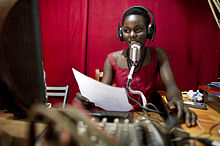- Media of Sudan
-
Sudan has a large number of local and national newspapers. The major national dailies are published in Arabic or English. Sudan Television broadcasts sixty hours of programming a week. The Sudan National Broadcasting Corporation airs radio programming in Arabic, English, French, and Swahili. Radio and television stations are state-controlled entities and serve as outlets for the government viewpoint. Journalists and the papers they serve, although subject to government censorship, operate with more freedom and independence than in most neighboring countries or Arab states. The Voice of Sudan, sponsored by the National Democratic Alliance, broadcasts in Arabic and English. The opposition Sudan People’s Liberation Army issues its own newspapers and journals.
Contents
Censorship after the coup
Before the 1989 coup, Sudan had a lively press, with most political parties publishing a variety of periodicals. In Khartoum, twenty-two daily papers were published, nineteen in Arabic and three in English. Altogether, the country had fiftyfive daily or weekly newspapers and magazines. The RCC-NS banned all these papers and dismissed more than one thousand journalists. At least fifteen journalists, including the director of the Sudan News Agency and the editor of the monthly Sudanow, were arrested after the coup. Since coming to power, the RCC-NS has authorized the publication of only a few papers and periodicals, all of which were published by the military or government agencies and edited by official censors. The leading daily in 1991 was Al Inqadh al Watani (National Salvation).
Radio and television
Radio and television broadcasting are operated by the government. In 1990, there were an estimated 250,000 television sets (now there are about one million) in the country and about six million radio receivers. Sudan Television operated three stations located in Omdurman, Al Jazirah, and Atbarah. The major radio station of the Sudan National Broadcasting Corporation was in Omdurman, with a regional station in Juba for the south. Following the 1989 coup, the RCC-NS dismissed several broadcasters from Sudan Television because their loyalty to the new government and its policies was considered suspect.
In opposition to the official broadcast network, the SPLM operated its own clandestine radio station, Radio SPLA, from secret transmitters within the country and facilities in Ethiopia. Radio SPLA broadcasts were in Arabic, English, and various languages of the south. In 1990, the National Democratic Alliance began broadcasts on Radio SPLA's frequencies.
Another clandestine radio station, Radio Dabanga, began broadcasting in December 2008 using shortwave transmitters of Radio Netherlands Worldwide. Government-run Radio Omdurman ran jamming signals to attempt to interfere with reception during Radio Dabanga's broadcast times, but these jamming efforts were ineffective, in part because Radio Dabanga used two shortwave frequencies.[1]
References
 This article incorporates public domain material from websites or documents of the Library of Congress Country Studies.
This article incorporates public domain material from websites or documents of the Library of Congress Country Studies.
- ^ http://allafrica.com/stories/200912040735.html Darfur Radio Show Launched, 'Institute for War and Peace Reporting'
See also
 Sudan topics
Sudan topicsStates Al Jazirah · Al Qadarif · Blue Nile · Kassala · Khartoum · North Darfur · North Kurdufan · Northern · Red Sea · River Nile · Sennar · South Darfur · South Kurdufan · West Darfur · White NileHistory Demographic · Economic · Military
Timeline · Early · Coming of Islam · The Turkiyah · The Mahdiyah · Anglo-Egyptian rule · Independent Sudan · First Civil War · Nimeiri Era · Second Civil War · Transitional Military Council · Mahdi Coalition Governments · War in DarfurEconomy History · Transport · Communications · Companies · Merowe Dam · Sudanese pound · Sudanese dinar · Banks · TaxationPolitics · Military Constitution · President · Vice President · Prime Minister · Cabinet · Foreign relations · Sudanese Air ForceGeography
DemographicsGeology · Mountains · Lakes · Rivers · Volcanoes · Languages · Religion (Islam) · Social order · Ethnic groups · Education · Ethnic minorities · Human rights · Health · Refugees of Sudan · States · CitiesCulture Media of Africa Sovereign
states- Algeria
- Angola
- Benin
- Botswana
- Burkina Faso
- Burundi
- Cameroon
- Cape Verde
- Central African Republic
- Chad
- Comoros
- Democratic Republic of the Congo
- Republic of the Congo
- Côte d'Ivoire (Ivory Coast)
- Djibouti
- Egypt
- Equatorial Guinea
- Eritrea
- Ethiopia
- Gabon
- The Gambia
- Ghana
- Guinea
- Guinea-Bissau
- Kenya
- Lesotho
- Liberia
- Libya
- Madagascar
- Malawi
- Mali
- Mauritania
- Mauritius
- Morocco
- Mozambique
- Namibia
- Niger
- Nigeria
- Rwanda
- São Tomé and Príncipe
- Senegal
- Seychelles
- Sierra Leone
- Somalia
- South Africa
- South Sudan
- Sudan
- Swaziland
- Tanzania
- Togo
- Tunisia
- Uganda
- Zambia
- Zimbabwe
States with limited
recognition- Sahrawi Arab Democratic Republic
- Somaliland
Dependencies and
other territories- Canary Islands / Ceuta / Melilla / Plazas de soberanía (Spain)
- Madeira (Portugal)
- Mayotte / Réunion (France)
- Saint Helena / Ascension Island / Tristan da Cunha (United Kingdom)
- Western Sahara
Categories:- Sudanese media
Wikimedia Foundation. 2010.

